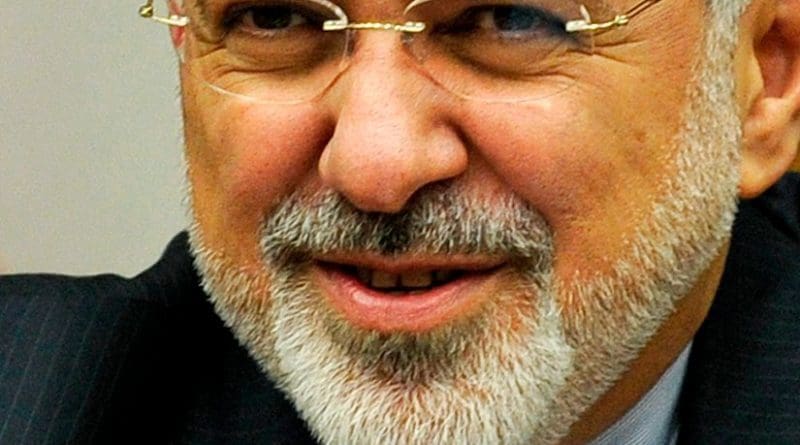Iran’s ‘Non-Zero-Sum Game’ In Syria – OpEd
On Monday, UN Secretary-General Ban Ki-Moon met Iran’s foreign minister Mohammad Javad Zarif and urged Iran to find a political solution for the conflict in Syria. Zarif has recently unveiled a 4-point peace plan and has been actively search for regional and extra-regional partners to form a viable coalition for peace in troubled Syria.
But, the military developments on the ground appear to be moving faster than the diplomatic track, in light of Russia’s new “game-changer” air campaign that has come at a critical juncture in the bloody conflict that has seen serious setbacks for Damascus this year. Although in his UN speech, Russian President Putin called for a WWII-style anti-terrorism front, that is unlikely to happen given the depth of current US-Russia hostilities and, instead, we are likely to witness US’s continued support for the Syrian rebels, who are now targeted by Russia’s sophisticated war planes. In other words, the upper hand belongs to the possibility of proxy wars rather than collective action in Syria.
Much depends, however, on the political and diplomatic events and developments as well. Presently, the inking of a Russia-Iran-Iraq intelligence-sharing agreement on ISIS, followed immediately by the Russian military intervention in Syria, has been widely interpreted in the West as an ominous development that will “alter the balance of forces in the Middle East” in favor of the anti-West alliance that includes Syria and Lebanon’s Hizbollah. Some Iraqi officials are now openly pondering asking for Russia’s extension of their air campaign to Iraq, given their criticisms of the “ineffective” and or “decorative” US air raids on terrorists, thus raising the prospect of a substantial new Russian influence in the Middle East, much to the chagrin of US policy-makers.
In Syria, air campaign will not suffice, which is why there are unconfirmed reports of an imminent ground offensive by the Syrian government in northern parts of the country with much assistance by Iranian (and perhaps Russia) forces. This air and ground campaign will likely succeed in stabilizing the situation in the government-held territories and turning the tide against the rebels in the areas adjacent to Lebanon, considered as vital strategic link between Iran and Hizbollah.
A successful Russian campaign in Syria acting as stimulant for Iraq’s invitation of Russian air support can only be interpreted in Washington as a net geostrategic minus with Russians stepping in the “vacuum of American power.” This “power vacuum” is, however, the result of several inter-related factors, including war fatigue, overstretch, and ambiguous policies that respond to contradictory interests, such as the Sunni Arabs’ push to cause the disintegration of Iraq and Syria through proxy wars. The US has as a result exhibited contradictory behavior that in the final analysis does not satisfy anyone and contributes to a credibility problem. If this pattern of US policy in the Middle East continues, there will be a “credibility vacuum” alongside “power vacuum” to the detriment of US’s strategic interests in the region, benefiting its Russian rival.
With respect to Iran, the new alliance with Russia serves Iran’s interest of bolstering its key Syrian and Lebanese allies and undermining the Saudi-led strategy of sowing a radical Sunni enclave at the Syrian-Lebanese border that would choke off Iran’s supply route to Hizbollah. The military and strategic calculus has left no room for a policy alternative to Iran, even though on the diplomatic front Iran is still committed to finding a durable political solution in Syria.
Henceforth, if President Obama remains consistent with his UN speech, wherein he left the door for cooperation with Iran on Syria open, then there would be some room for a common cause, highly unlikely at the moment due to the intense Iran-Saudi hostilities and Tehran’s serious misgivings about the American intention in Syria. In the absence of sufficient trust between Washington and Tehran, it is difficult to cobble together an all-inclusive alliance on Syria and, realistically speaking, the more distinct possibility is increased polarized action and proxy wars.
This ‘hard core’ possibility now looming on the horizon can be neutralized or avoided only if there is a qualitative improvement in US-Iran and Saudi-Iran relations, which in turn raises the issue of political and diplomatic prudence championed by the Rouhani administration. The latter is not seeking an exclusionary plan of action for Syria, and yet, it recognizes the immense difficulties of bringing the US and its allies on board when Iran is perceived as acting in concert with Russia. But, the Iranian and Russian interests in Syria do not coincide one hundred percent and Iran is as always wary of big power intervention in Middle East affairs, even though this time around it is nominally in the joint interests of saving Assad’s regime.

